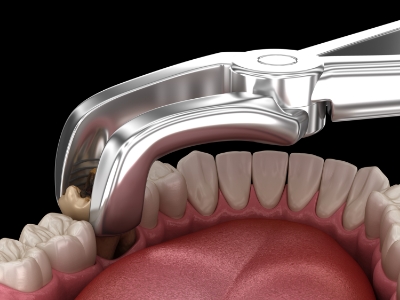Tooth Extractions Succasunna
The Opportunity to Build a Healthier Smile

You only get one set of permanent teeth, which is why we never suggest tooth extractions in Succasunna unless we feel it’s critical for the health of your remaining teeth and gums. In cases where severe infection or decay are wreaking havoc on your smile, Dr. Goldberg and our team at Morris County Dental Associates can rebuild your grin to be healthier and more functional than before. We also offer same-day dental appointments for our patients facing emergency situations like tooth pain, so don’t hesitate to give us a call!
Why Choose Morris County Dental Associates for Tooth Extractions?
- Same-Day Emergency Dental Appointments
- We Accept Dental Insurance
- In-House Dental Implant Placement & Restoration
When Are Tooth Extractions Necessary?

Tooth extractions can be recommended for a variety of reasons, but the only way to know for sure whether it’s necessary in your situation is to receive an examination from Dr. Goldberg. Typically, this treatment is recommended in the following scenarios:
- Dental damage that isn’t able to be repaired.
- A tooth infection that’s at-risk of spreading to surrounding teeth.
- Gum disease has compromised the bone and tissue supporting a tooth.
- An emerging tooth that is at-risk of causing crowding.
- An accident has cracked or fractured a tooth.
The Tooth Extraction Procedure

Dr. Goldberg will administer a local anesthetic to numb the area of the tooth that is being extracted. He will then gently remove the tooth by rocking it back and forth in the socket. When the tooth is out of the socket a blood clot will form. It’s important to try to maintain the clot in place.
Dr. Goldberg will pack a gauze pad into the socket and will have you bite down on it to stop the bleeding. If the gums were opened, they may be closed with a few self-dissolving stitches. If you are replacing the tooth with a dental implant, a bone graft will be placed into the socket.
Tooth Extraction Recovery

Having a tooth extracted is often considered oral surgery, and you can expect some pain. However, it is usually mild and manageable with over-the-counter pain medications. Ice and saltwater rinses may also be needed. Dr. Goldberg will review your customized post-treatment instructions with you before you leave our office. You should continue to brush and floss, but you need to avoid the extraction site.
The initial healing period after a tooth extraction usually takes from one to two weeks. New bone and gum tissue will start to grow into the gap. However, you may need to replace the missing tooth. When a tooth or teeth are gone, the adjacent teeth tend to slide into the gap, which is a problem for the person’s bite and alignment. The best replacement for a missing tooth is often a dental implant.
TOOTH EXTRACTION FAQS
Will I feel pain during the tooth extraction procedure?
While you shouldn’t feel pain during a tooth extraction, you may experience some discomfort or pressure. Dr. Goldberg uses local anesthesia to numb the area around the tooth, ensuring you don’t feel pain during the procedure. You will feel some tugging or pressure as he works, but it should not be painful. If you’re anxious or concerned about potential discomfort, discussing your worries with your dentist beforehand can help them tailor their approach to ensure your comfort during the extraction.
Can I use sedation dentistry to get my tooth pulled?
Yes, we offer dental sedation for patients who suffer from dental anxiety. Sedation dentistry is available for tooth extractions. Dr. Goldberg will review the various sedation techniques with you, which include oral sedatives, nitrous oxide, or intravenous (IV) sedation. He will decide which option is best for you after reviewing your medical history.
How long should I rest after tooth extraction?
After a tooth extraction is complete, patients will need to rest for at least one day or 24 hours. Most patients limit their physical activity for a couple of days following the procedure to give their bodies time to heal.
How long will it hurt after tooth extraction?
Most patients report feeling pain for one to three days following their tooth extraction. The area may be tender and swollen for a week or two following the procedure, but these effects can be soothed with an ice pack or over the counter pain medication.
What is the best OTC painkiller after tooth extraction?
The best OTC painkiller following a tooth extraction is ibuprofen. It will lessen the swelling and relieve pain temporarily while you heal. Follow instructions and do not overdo it because painkillers can sometimes extend recovery and healing time.
What are the do’s and don’ts after tooth extraction?
After tooth extraction patients should avoid eating and chewing hard or sticky foods. It is recommended to stick to a soft diet for the first few days following the extraction. Patients should also avoid smoking following their tooth extraction to prevent dry socket.
How can I make my tooth extraction heal faster?
Patients can help speed up their recovery from a tooth extraction by holding gauze over the extraction site, being careful while eating and drinking, avoiding smoking, rinsing with a warm salt water solution, and resting.
How long should I use saltwater after tooth extraction?
After a tooth extraction patients may rinse with a warm saltwater solution to soothe their gums and remove bacteria. Most patients rinse with saltwater twice a day until the area feels like it is healing.
Does a cracked tooth require an extraction?
Not all cracked teeth require extraction. Treatment depends on the severity and location of the crack. Minor cracks may be repaired with bonding or a crown, while more severe cases may necessitate extraction. Dr. Goldberg will assess the extent of the damage and determine the most appropriate course of action.
Does an infected tooth require extraction?
Not necessarily. Infected teeth are often treated with a root canal to remove the infection and preserve the tooth. A tooth extraction is only considered if the infection is severe, irreparable damage exists, or if the tooth poses a risk to overall oral health. Dr. Goldberg will examine your tooth and take X-rays to determine which treatment is best for your infected tooth.
